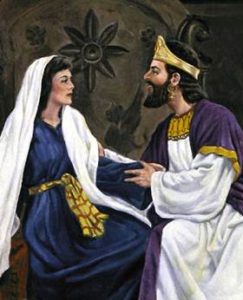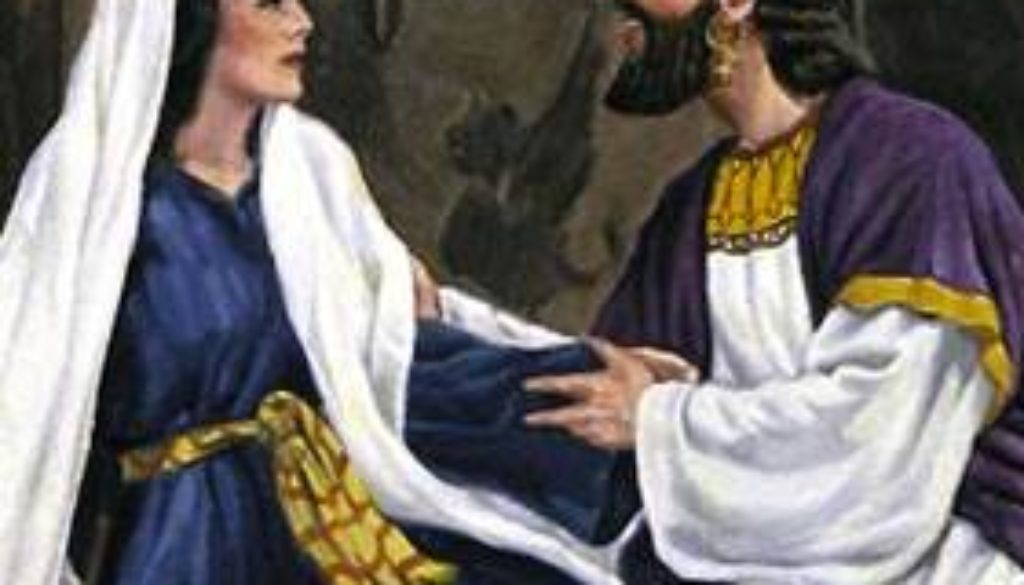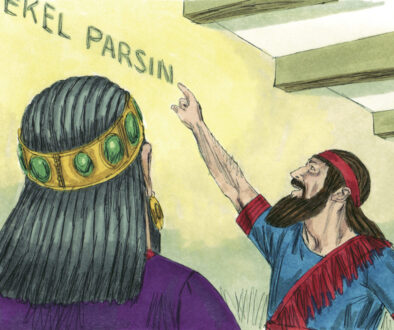1 Kings 2:13-46 Solomon’s Start

Solomon has already been on the throne but now he is without David’s advice or backup. Solomon starts his reign by dealing with the men David identified and his brother Adonijah.
Our story starts out shortly after David’s death. Adonijah goes to Bathsheba to ‘innocently’ ask her a favor. He knew he couldn’t go to Solomon with his request but he believed he could get what he wanted by her going in his place.
As a regular everyday person, I saw nothing wrong with Adonijah’s request and apparently neither did Bathsheba. Adonijah wanted to have Abishag the Shunammite, who had kept David warm in the end of his life, for his wife. She never had sexual relations with the king so I’m assuming she is still a virgin. She has also been in the service of the king which puts her out of reach of most men. I thought Adonijah could have been doing her a favor by making sure she was cared for as a wife instead of locked away. It appears that Bathsheba saw nothing wrong with this request either.
But Solomon saw through the subterfuge. When Absalom took over David’s throne he raped David’s concubines to establish his kingdom. He took the king’s women. Adonijah was plotting to do the same. The people saw her as one of David’s women. Whether he slept with her or not didn’t matter as they probably assumed he had. Taking her as his wife would give Adonijah claim to the throne.
Besides all the political positioning, in Leviticus 20:11 God commanded that a son not sleep with his father’s wife. He “uncovers his father’s nakedness” and both are to be put to death for such an act; the man and the father’s wife. Abishag fit this role.
How did Bathsheba feel after Solomon exposed Adonijah’s plot? Was she surprised by how easily she was taken in? Was this something a woman would be expected to know? Was she originally trying to care for Abishag by providing her a future? Did she like Adonijah? Was she angry with him? Was she angry at herself? I bet it made her think twice before asking Solomon to promise her something without hearing if first. Solomon’s own pen speaks of this in Proverbs 18:13. He and Bathsheba were both guilty of this, he more so that her for she simply said, “Speak” when Adonijah asked her to promise a positive answer before posing the request.
Adonijah had been pardoned by Solomon when he was brought back from holding onto the horns of the altar following his failed bid for the kingdom. Solomon had sent him to his home in peace. But his attempt to get at the throne another way would cost him his life. And it would cost it THAT VERY DAY. Solomon wasn’t fooling around. He wasn’t going to let Adonijah try yet another way to get the throne. This would stop.
Solomon had no way of knowing if Adonijah was acting in conjunction with his past supporters but he had to assume he was to be safe. Abaithar and Joab supported him when he tried to become king. Solomon needed to deal with these men immediately also.
Abiathar had been with David for a LONG time. He had come to David while he was in the caves of Adullam after fleeing Nob. Abiathar stayed loyal to David throughout those years of wandering, years as king in Judah, the early years of David’s rein in Israel, up through Absalom’s rebellion and right up to the time of Adonijah’s bid for the throne. Somehow Adonijah had won him over. I wonder what he promised him. More prestige? The place of high priest? To bring the actual Tabernacle to Jerusalem? We will never know.
After dealing with Adonijah, Abiathar was called to stand before Solomon. His life could have been taken from him but it wasn’t. Instead his livelihood and position was. Abiathar lost everything that made him ‘stand out in a crowd’. And it was his own fault. He had no one to blame but himself. His removal also completed God’s judgment on Eli and his house. Abiathar was apparently of Eli’s line. I would bet that his son Jonathan was not allowed to serve or his sons either, thus fully completing God’s promise of judgment.
Next on the chopping block was Joab. Not only had Joab supported Adonijah but he had committed cold blooded murder on two separate occasions. He had approached both men he killed as a friend and then swiftly stabbed them, spilling their insides onto the ground. HE justified his own actions but God and David didn’t. Joab was ‘avenging’ acts done in wartime while in peace.
Abner was Joab’s first official victim. Joab killed Abner after he concluded peace talks with David, claiming it was blood guilt for killing Asahel. Asahel had been pursuing Abner in battle. Abner asked him to ‘turn aside’ so he wouldn’t have to kill him and face Joab but Asahel refused. Abner finally struck Asahel in self defense during war. He was NOT guilty of murder, which is what the provision that allowed a family member to take the life of the one who took a life.
Amasa was Joab’s second official victim. We are not even given a reason why he killed Amasa. It could be that Joab was jealous of him as David had put him in Joab’s original position. He could also have justified it in his heart as payment for standing with Absalom during his revolt. The closest thing we have to a reason in the reading was that Amasa took more than the three days allotted to him to round up troops to go after Sheba. It was ‘war time’ at the present moment but not between Joab and Amasa; only in Joab’s heart.
On his deathbed David told Solomon not to let Joab die peacefully in old age. He needed to pay for his crimes. Why David didn’t see to this himself is a mystery, but Solomon would do so now.
Joab had his ‘ear to the ground’ and heard what had happened to both Adonijah and Abaithar. He expected that Solomon’s men would be coming after him next. He ran for the Tabernacle just as Adonijah had done earlier. The act had saved Adonijah’s life, maybe Joab figured it would save his too. Not this time. Joab would be given no reprieve. His life was required of him THAT DAY.
The fact that Joab was holding onto the horns of the altar means he was expecting ‘safety’ from God. But God judged him guilty too. God did nothing to stop or punish Benaiah for killing him right there at the altar. Benaiah didn’t want to shed the blood of a man in the house of the Lord. Joab’s refusal to come out was him trying to guarantee his own safety. Joab’s own words were fulfilled. “No, I will die here” (verse 30b).
With Joab’s death, the guilt of his actions were removed from the house of David. Someone had to be accountable for that blood. The blood that David shed was paid for with the life of the baby Bathsheba first bore him. If Joab went to his grave unpunished, the guilt for Abner and Amasa’s blood would have fallen on the shoulders of David’s descendants. David was guilty of not holding Joab accountable. Solomon remedied that wrong at his father’s request.
The last person Solomon needed to deal with wasn’t part of Adonijah’s bid for the throne. He was the man who rained down curses, rocks and dirt upon David and those who followed him as he fled Jerusalem when Absalom took power. This man made a bad situation even worse. He harangued and harassed David all the way to the Jordan. David and his followers were not only bone tired but soul tired because of Shimei. Shimei met David on the way back and apologized for his behavior but, although David pardoned him, he never forgot about that ordeal. David asked Solomon to use his wisdom and deal with him. David had sworn that HE would never harm him for his actions but Solomon hadn’t taken that vow. Nor had David promised that one of his sons wouldn’t take up the debt for repayment.
Solomon is gracious and shrewd. He gives Shimei absolute boundaries and waits for him to break them. He puts his fate in his own hands. Shimei is confined to the city of Jerusalem. He is free to go about the city and conduct business however he sees fit. But the moment he crosses the Kidron brook, his life is forfeit. Shimei swallows hard and makes a solemn promise to abide by Solomon’s conditions.
For three years Shimei followed the rules. He towed the line and stayed within his boundary lines. But one of his slaves had run off and he wanted him back. I don’t know if he was required to appear in person to verify his claim or if he just wanted to, but Shimei went to Gath. FAR outside the boundaries set for him. He probably would have been safe if he stayed in Gath but he came back and tried to pretend nothing had happened.
Solomon had been patiently waiting like a cat at a mouse hole. His patience was rewarded. Shimei paid with his life for breaking his solemn vow to the Lord, not for cursing David. What he had done to David was brought up but not used as the reason for his sentence. ‘You reap what you sow’ rules kept Solomon’s hands clean. And the final nail in his coffin was the fact that David’s kingdom was firmly established, in spite of everything Shimei had tried.
David’s last instructions were done. The one regarding favor for the sons of Barzllia would continue with Solomon as well. With these last pieces concluded Solomon stepped completely from his father’s shadow and into his own role as king of Israel. The one thing from his father that he didn’t step out from under was the Lord. Yes, Solomon had significant sins of his own but he loved the Lord as his father had done.
I remember stepping ‘out from under’ my parent’s ‘shadow’ when I made my first home as a wife. It felt strange for a while and I was grateful that I could call my mom for advice. But I had to establish my own role as an adult, wife, and mother. And I’m GLAD I followed her example in my relationship with God. We have differences of course but we both love the Lord with all our hearts. Someday I pray I will be able to say the same thing of my children.
Father God, thank You for the examples You gave me in my parents. Their love for You has been a foundation in my life. I PRAY my love for you is something my children will never forget and will draw them back to You one day.
Thank You for the stories in Your word where I can see love for one’s parent’s and for You walked out. It is comforting to know that I don’t have to be perfect to be loved or used by You.



